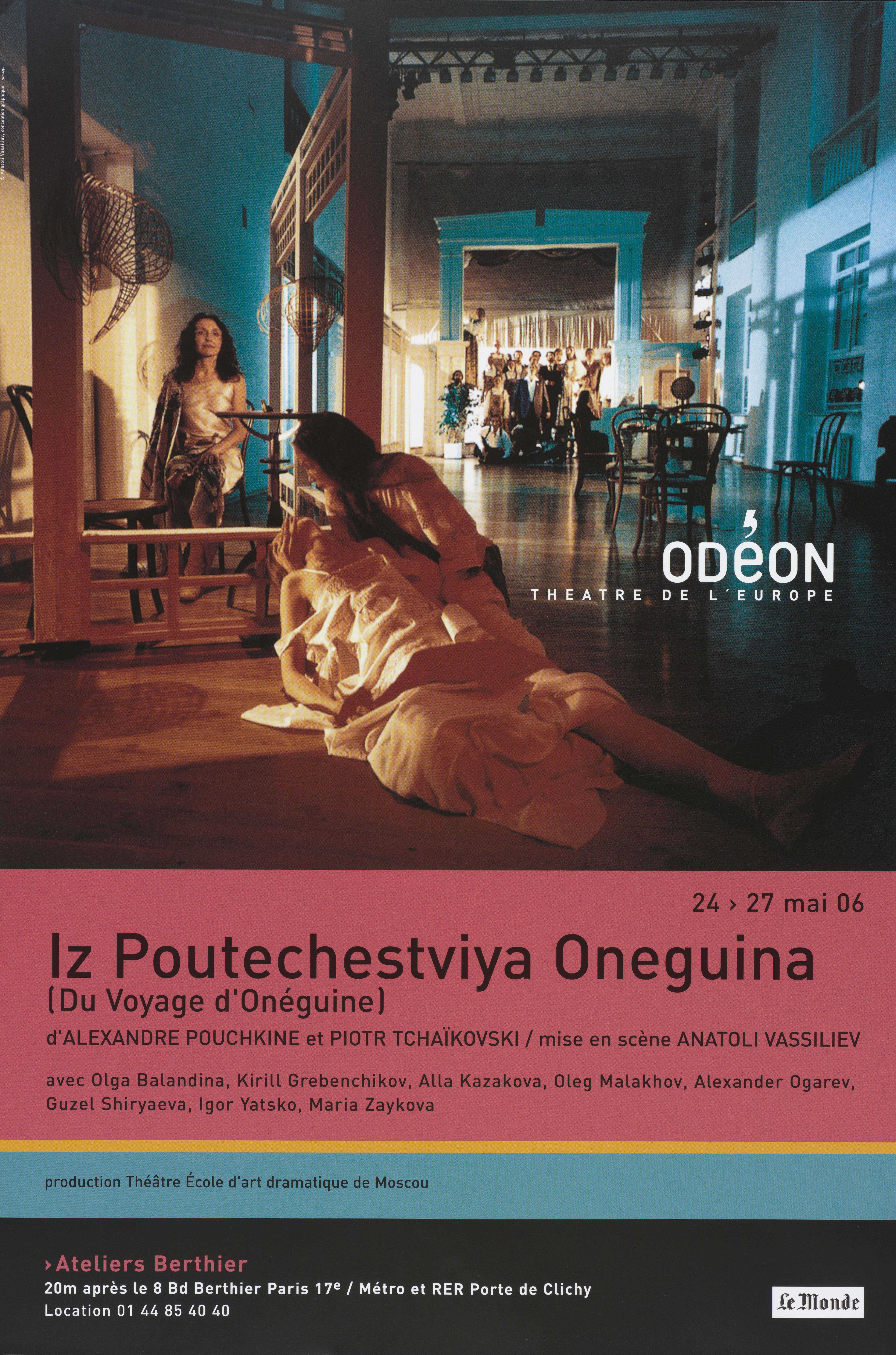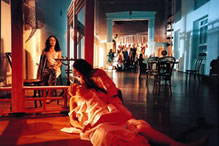Vassiliev is a master and a rare creature. His first goal is to perfect an artistic experience that can only be, in his final analysis, spiritual. Time means less to him than the depth of this gestation; and the result, when there is one, is only a last aspect of a process that could have lasted for years. Vassiliev, who continues to train generations of actors in his School of Dramatic Arts, has sometimes sacrificed public performances of his work to his pedagogic demands, and this for several seasons in a row. He returns to us today with a staging that is every bit characteristic of him. Subtitled, The Unfinished Work, this "voyage" is inspired by a novel in verse that Nabokov classified as "an international classic on par with Hamlet or Moby Dick." All Russians have leaned a few verses of this masterpiece by heart at one point in their studies; all have written about the troubles of Eugene and Tatiana, who fall in love at an inopportune moment and miss the meeting of souls while "happiness was oh so close."
The novel's framework, the duel in which Onegin fires a bullet into his friend and poet, Lenski's heart, is as familiar to them as the subtle combination of irony and romanticism, lightness and lyric confidence, Byronesque parody and heartrendering sincerity that make up the poem's atmosphere. The biographical fatality that says that Pushkin seemed to prophesize his own death in his text turned Eugene Onegin into a veritable myth, whose influence has spread far beyond literature to make itself felt in characters and behavior. By taking on this monument and proposing a dramatic interpretation of it, Vassiliev could count on the complicity of a Muscovite audience profoundly steeped in the original material.
Pushkin himself underlined that his work should be read as a fragmented, "unfinished work." The text is scattered with deleted passages, replaced by dotted lines. More seriously, the author indicated that an entire chapter (the eighth), in which Onegin travels across Russia after having killed his friend, was "withdrawn from his novel." In certain ways, Pushkin handed his readers a work-in-progress. In order to bring his stone to this "unfinished work," Vassiliev started from the vanished eighth chapter, conserved fragments of a tenth chapter, as well as Tchaikovsky's famous aria from Tatiana's letter. As the sub-title indicates, the vision of Onegin he proposes doesn't intend to be more complete or "finished" than the original. Walking in Pushkin's footsteps, as faithful to his spirit of digression and his cult of beauty as his sense of derision, Vassiliev restores the poem to its oral character by orchestrating an amazing polyphony. Under the direction of this master of scenic counterpoint, the text opens, breaths, becomes song - and laughter - again. Because this is perhaps Vassiliev's funniest work to date. Juggling brilliantly with forms of theater, opera, German cabaret and cinema, he doesn't miss an opportunity to laugh at Russia and Russians, including a certain Vassiliev, along the way.
About Onegin's Voyage is one of the most beautiful homage ever rendered from one artist to another. Tragic and comic like life itself, if it celebrates what it loses on the road (starting with the innocence of youth), it's to better honor what can sometimes be gained: a bit of wisdom, a bit of art.
Cast
According to the novel in verse of ALEXANDRE POUCHKINE and the opera of PIOTR TCHAIKOVSKI
directed by: ANATOLI VASSILIEV
scenography : Igor Popov and Anatoli Vassiliev
costumes : Vadim Andreev
lightings : Ivan Danitchev
choregraphy : Vassili Yuchenko
Chor conductor: Svetlana Anistratova
piano : Natalia Nikolskaya
words : Olga Balandina, Kirill Grevbenchikov, Alla Kazakova, Oleg Malakhov, Aleksandr Ogarev, Gouzel Shiriaeva, Igor Yatsko, Maria Zaikova
Songs : Igor Danilov, Viktoria Smolnikova, Serguei Vasiltchenko, Vadim Andreev
Collective creation on 1995-2003 to the Theater " School of Dramatic art ", Moscow
Duration : 3h40
,



